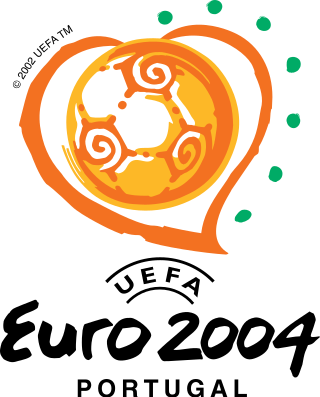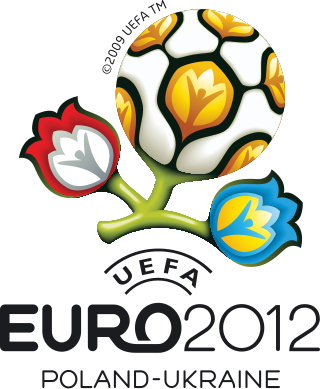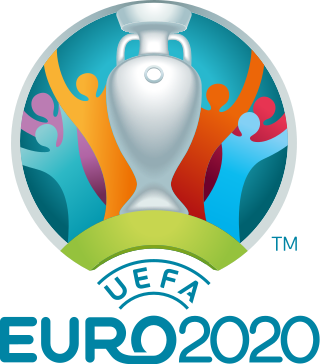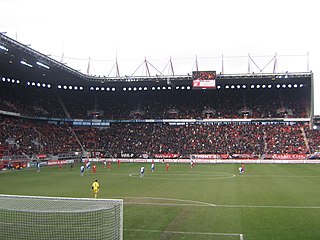
The 2004 UEFA European Football Championship, commonly referred to as Euro 2004, was the 12th edition of the UEFA European Championship, a quadrennial football competition contested by the men's national teams of UEFA member associations. The final tournament was hosted for the first time in Portugal, from 12 June to 4 July 2004. A total of 31 matches were played in ten venues across eight cities – Aveiro, Braga, Coimbra, Guimarães, Faro/Loulé, Leiria, Lisbon, and Porto.

The 2000 UEFA European Football Championship, also known as Euro 2000, was the 11th UEFA European Championship, a football tournament held every four years and organised by UEFA, the sport's governing body in Europe.

The 2008 UEFA European Football Championship, commonly referred to as UEFA Euro 2008 or simply Euro 2008, was the 13th UEFA European Championship, a quadrennial football tournament contested by the member nations of UEFA. It took place in Austria and Switzerland from 7 to 29 June 2008.

The 2012 UEFA European Football Championship, commonly referred to as UEFA Euro 2012 or simply Euro 2012, was the 14th European Championship for men's national football teams organised by UEFA. The final tournament, held between 8 June and 1 July 2012, was co-hosted by Poland and Ukraine, and was won by Spain, who beat Italy in the final at the Olympic Stadium, Kyiv, Ukraine.
The knockout stage of UEFA Euro 2008 began with the quarter-finals on 19 June 2008, and was completed on 29 June 2008 with the final at Ernst-Happel-Stadion in Vienna.
Group A of UEFA Euro 2012 was played from 8 to 16 June 2012. The pool was made up of co-host Poland, Czech Republic, Greece and Russia. The top two finishing teams, Czech Republic and Greece, progressed to the quarter-finals, while Russia and Poland were eliminated from the tournament.
The knockout stage of UEFA Euro 2012 began with the quarter-finals on 21 June 2012, and was completed on 1 July 2012 with the final at the Olympic Stadium in Kyiv, won by Spain. After the completion of the group stage on 19 June 2012, eight teams qualified for the quarter-finals, which were played from 21 to 24 June 2012. Host nations Poland and Ukraine failed to qualify for the quarter-finals, making it only the third time in European Championship history that the host nation(s) failed to make it out of the group stage; at Euro 2000, co-host Belgium were eliminated at the group stage, and at Euro 2008, co-hosts Austria and Switzerland also failed to qualify for the quarter-finals.
Group C of UEFA Euro 2012 began on 10 June 2012 and ended on 18 June 2012. The pool consisted of defending champion Spain, Italy, Republic of Ireland and Croatia. The group was jokingly dubbed the "group of debt" by multiple media outlets, in reference to the European sovereign debt crisis facing some of its members. Spain and Italy progressed to the quarter-finals, while Croatia and Republic of Ireland were eliminated from the tournament. Republic of Ireland equalled the worst performance by a team in the group stage of the European Championships, finishing with no points and a goal difference of −8. Both Spain and Italy made it through the quarter-finals and semi-finals to reach the final for a second meeting in the tournament.
Group D of UEFA Euro 2012 began on 11 June 2012 and ended on 19 June 2012. The pool was made up of Ukraine, Sweden, France and England. The top two teams, England and France, progressed to the quarter-finals to play Italy and Spain respectively, while Ukraine and Sweden were eliminated from the tournament.

The 2020 UEFA European Football Championship, commonly referred to as UEFA Euro 2020 or simply Euro 2020, was the 16th UEFA European Championship, the quadrennial international men's football championship of Europe organised by the Union of European Football Associations (UEFA). To celebrate the diamond jubilee of the European Championship competition, UEFA president Michel Platini declared that the tournament would be hosted in several nations as a "romantic" one-off event, with 11 cities in 11 UEFA countries each providing venues for the tournament, making it the second senior international tournament in history after the 2007 AFC Asian Cup to have more than two nations co-hosting it.
The UEFA European Championship is one of the major competitive international football tournaments, first played in 1960. The finals stage of the tournament takes place every four years, with a qualifying competition beforehand. The sixteenth tournament was held across Europe in 2021.

The 2024 UEFA European Football Championship, commonly referred to as UEFA Euro 2024 or simply Euro 2024, was the 17th UEFA European Championship, the quadrennial international football championship organised by UEFA for the European men's national teams of their member associations. Germany hosted the tournament, which took place from 14 June to 14 July 2024. The tournament involved 24 teams, with Georgia making their European Championship debut.
The UEFA European Championship is the main football competition of the men's national football teams governed by UEFA. Held every four years since 1960, in the even-numbered year between FIFA World Cup tournaments, it was originally called the UEFA European Nations' Cup, changing to the current name in 1968.
The Denmark national football team have participated in ten UEFA European Championships, and won the tournament once. Their first tournament was the 1964 edition, in which they secured fourth place. In the final of UEFA Euro 1992 in Sweden, Denmark's 2–0 victory over Germany resulted in their first major tournament title.
Portugal have participated in nine editions of the UEFA European Championship. Their first tournament was in 1984, and the side have advanced past the group stage in every edition they've participated in so far. Portugal have reached the semi-finals on five occasions, and reached the final as hosts in 2004, however losing to the heavy tournament underdogs Greece. They captured their first major tournament win after defeating hosts France 1–0 in the final of Euro 2016.
The knockout stage of UEFA Euro 2016 began on 25 June 2016 and ended on 10 July 2016 with the final in Saint-Denis, France, near Paris.

The UEFA Women's Euro 2017 final was a football match to determine the winner of UEFA Women's Euro 2017. The match took place on 6 August 2017 at De Grolsch Veste in Enschede, Netherlands, and was contested by the winners of the semi-finals, the Netherlands and Denmark.

Group B of UEFA Euro 2020 took place from 12 to 21 June 2021 in Copenhagen's Parken Stadium and Saint Petersburg's Krestovsky Stadium. The group contained host nation Denmark, Finland, Belgium and host nation Russia. The head-to-head match between the hosts took place at Denmark's Parken Stadium.
The knockout stage of UEFA Euro 2020 began on 26 June 2021 with the round of 16 and ended on 11 July 2021 with the final at Wembley Stadium in London, England.
The knockout stage of UEFA Euro 2024 began on 29 June 2024 with the round of 16 and ended on 14 July 2024 with the final at Olympiastadion in Berlin, Germany.













